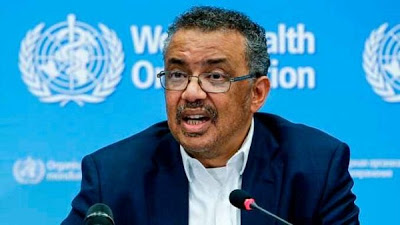World Health Organisation (WHO) on Saturday declared Monkeypox disease a public health emergency of international concern.
A statement by the WHO Director-General, Tedros Adhanom Ghebreyesus, at the Virtual Press Conference to update on the report of the 2nd meeting of the International Health Regulations (IHR) Emergency Committee on the multi-country outbreak of monkeypox on Saturday said that the organisation was being compelled to declare health emergency on Monkeypox following its widespread.
He however expressed hope that the outbreak can be stopped with the right strategies in the right groups since it is mostly transmitted among men who have sex with fellow men.
He also said that IHR committee was unable to reach a consensus on whether the outbreak represents a public health emergency of international concern.
He said: “Although I am declaring a public health emergency of international concern, for the moment this is an outbreak that is concentrated among men who have sex with men, especially those with multiple sexual partners.That means that this is an outbreak that can be stopped with the right strategies in the right groups”.
Ghebreyesus said that it was essential that all countries work closely with communities of men who have sex with men, to design and deliver effective information and services, and to adopt measures that protect the health, human rights and dignity of affected communities.
He also said that stigma and discrimination can be as dangerous as any virus.
In addition to its recommendations to countries, WHO DG appealed to civil society organizations, including those with experience in working with people living with HIV, to join fighting stigma and discrimination.
According to him the tools that are available now, can stop transmission and bring the epidemic outbreak under control.
“A month ago, I convened the Emergency Committee under the International Health Regulations to assess whether the multi-country monkeypox outbreak represented a public health emergency of international concern.
“At that meeting, while differing views were expressed, the committee resolved by consensus that the outbreak did not represent a public health emergency of international concern.
“At the time, 3040 cases of monkeypox had been reported to WHO, from 47 countries.
Since then, the outbreak has continued to grow, and there are now more than 16 thousand reported cases from 75 countries and territories, and five deaths, he said.
NEWS: Top Canadian university exempts Nigerians seeking admission from IELTS, TOEFL, other English tests
WHO DG said committee on health emergency summoned to review the Monkey Pox epidemic was unable to reach a consensus on whether the outbreak represents a public health emergency of international concern.
“We have an outbreak that has spread around the world rapidly, through new modes of transmission, about which we understand too little, and which meets the criteria in the International Health Regulations.
For all of these reasons, I have decided that the global monkeypox outbreak represents a public health emergency of international concern.
Accordingly, I have made a set of recommendations for four groups of countries,” he said:
The DG said the reasons the committee members gave for and against were laid out in the report published on Saturday.
He further said that under the International Health Regulations, he was expected to consider five elements in deciding whether an outbreak constitutes a public health emergency of international concern:
“First, the information provided by countries – which in this case shows that this virus has spread rapidly to many countries that have not seen it before;
Second, the three criteria for declaring a public health emergency of international concern under the International Health Regulations, which have been met;
“Third, the advice of the Emergency Committee, which has not reached consensus;
Fourth, scientific principles, evidence and other relevant information – which are currently insufficient and leave us with many unknowns;
“And fifth, the risk to human health, international spread, and the potential for interference with international traffic,” he said.
The statement said that WHO had concluded in its assessment that the risk of monkeypox was moderate globally and in all regions, except in the European region where the risk is high.
“There is also a clear risk of further international spread, although the risk of interference with international traffic remains low for the moment,” he said
WHO said it had established dashboard to provide a global overview of the monkeypox epidemiological situation as reported to WHO and will be updated daily.
The report said it focuses on confirmed cases as defined by the WHO’s working case definition published in the Surveillance, case investigation and contact tracing for Monkeypox interim guidance.













